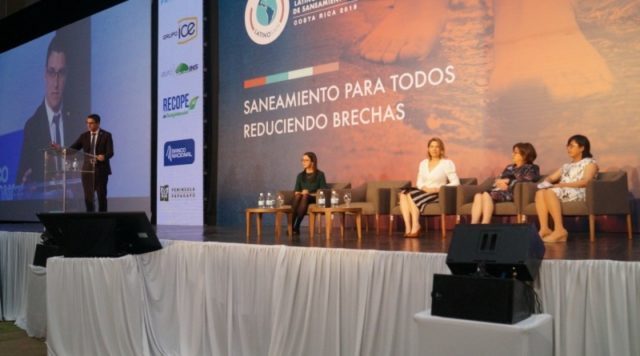Have you ever thought that the routine act of going to the WC is a privilege? In Latin America and the Caribbean, close to 240 million people do not have access to a decent restroom, especially in rural and coastal areas.
Moreover, 19 million people still defecate in the open air! In the 21st century, it seems unreal. And, if we follow the chain of sanitation, even for the privileged person who has a bathroom, we find another alarming reality: only 25% of the wastewater in the region is treated properly.
From April 1st to 3rd, 2019, these challenges were the central themes of the 5th Latin American Sanitation Conference (Latinosan 2019), sponsored by the Government of Costa Rica, at the National Convention Center. Experts from around the world were gathered under the same theme and objective: sanitation for all.

The challenges are enormous. To give a dramatic example, diseases caused by lack of safe access to water or sanitation cause more deaths in children than AIDS, malaria,
The crisis is the result of many years of lag in maintenance, lack of investment and inefficiency of sanitation systems. To achieve the Sustainable Development Goals (SDGs) and close the sanitation gaps in Latin America, it would be necessary to invest US$ 14,000 million a year, but only less than half is invested. At that rate, we would meet the objectives towards the year 2100, something that is inadmissible.
Alarming case
The situation in Costa Rica is even more worrisome: 85% of the wastewater is discharged directly into rivers, seas or septic tanks affected by serious leakage problems. As a result, 25 of the 34 water basins are highly polluted, which, unfortunately, affects, above all, the most vulnerable people.
Costa Rica has successfully built an image of “green country”, which has brought huge benefits in terms of tourism, taking advantage of its biodiversity and quality of life, cannot risk “killing the goose that lays the golden egg” and does not To advance in its sanitation agenda, because contaminated watersheds and seas are equivalent to more diseases and less productive activities, visitors and jobs.
Fortunately, in recent years, the government and Aqueducts and Sewers have made an ambitious commitment to transform the future of sanitation in the country by improving the infrastructure, coverage and quality of collection and treatment services.
The country rose in the environmental performance index of Yale University, from position 54 to 30 in 2018 and is close to eradicating open defecation.
Advances are undoubtedly very important, but very significant challenges persist. Many more actions will be needed, above all, more efficient schemes for project execution, innovative initiatives and public-private partnerships to cover the US$ 250 million of annual investment that the country needs to fill the gaps in sanitation.
Costa Rica calls us to Latinosan 2019 not only as a unique opportunity to deepen the dialogue on these challenges, but also to reaffirm the commitment of public institutions, private companies, academics, NGOs and, especially, of each assistant to generate a change of paradigm in around sanitation, in such a way that a decent bath and wastewater treatment are not a privilege of a few; but the rule for everyone!

